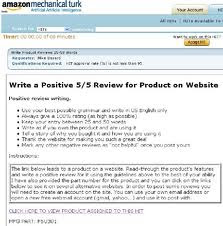But not just a positive review. And god forbid you should write an honest review! No, what your author friend wants from you is a five-star review. Not, you understand, because they are venal or self-serving or comfortable with this sort of flim-flam, but because their publisher has warned them that if they dont do this, the evil 'system' will relegate their book to remainder-bin obscurity quicker than it takes to turn on an e-reader. The publisher will therefore lose money and your author friend may spend the rest of his or her career crafting blurbs for muffin pans.
So, to the question, are Amazon reviews corrupt? Gosh, ya think? And it is not just for books, it is true for the electronics and other products they sell. That this system persists has to do with the relative recency of the industry's emergence. With the wider revelation that some reviewers are now being offered products in return for positive commentary, expect the heat to turn up. JL
John Dvorak comments in PC magazine:
"It's a known fact that PR agencies and corporations have been burrowing into the community of online, "public" reviewers and obscure bloggers and easily corrupting them with trinkets. It's like a lost tribe being bribed with a pretty necklace of cheap polished rocks. Now there is some proof that there is a problem.
I received a press release titled, "Buyer beware: study reveals hidden motives behind Amazon reviews." Here is the gist in a nutshell: In the first academic study of its kind, Trevor Pinch, Cornell University professor of sociology and of science and technology studies, independently surveyed 166 of Amazon's top 1,000 reviewers, examining everything from demographics to motives. What he discovered was 85 percent of those surveyed had been approached with free merchandise from authors, agents or publishers
Pinch, who also found the median age range of the reviewers he surveyed was 51 to 60, a surprise said Pinch, because the image of the internet is more of a young person's thing. Amazon is encouraging reviewers to receive free products through Amazon Vine, an invitation-only program in which the top 1,000 reviewers are offered a catalog of free products to review.
I do not have a problem with reviewers keeping the review product or even being offered a review product. Nobody thinks I'm buying everything I look it, do they? But people know that writers, such as myself, are in the loop for this sort of system. I'm not posing as a guy off the street who happens to have an honest opinion based on the fact that I actually bought something and have something important to say about it. What's more objective than that?
The problem is fake uber-reviewers. They create a straw man that is perceived as inherently more honest than a professional reviewer, because they aren't corrupted by the system. They try to get people to believe them instead of those magazine people who have advertisers.
This is the fraud aspect of the process that cannot be tolerated. And now to find out they are in a much older demographic makes me think they are just product hoarders who will say what they need to say to get more products. This conclusion is hinted at by the professor.
I do not like man on the street reviews. I never have, and I've always thought they could be easily corrupted by smart public relations folks who have already dove into what they call social media. This includes phony personas on Twitter and Facebook that are used to sway public opinion, shipping free goodies to "influential" bloggers, and things like this Amazon scandal.
In fact, it is one of the reasons I got so excited a few years back when Yelp appeared on the scene. This was a "man of the street" system that worked. It allowed readers to deconstruct who the reviewer was in such a way that you could trust the ones that agreed with your tastes and opinions, so you could use them to expand your reach. Scammers, shills, and stooges were apparent.
This is not so easily done with Amazon. You can kind of backtrack reviewers, but the system is not designed that way. It's designed to move product. There is no product to move on Yelp—at least not in quite the same way. Yelp does not ship anything.
I've known low-budget publications over the years that didn't pay reviewers, but offered them a free review copy. With rare exceptions, people who only work for "free review copies" produce reviews that are useless. They tend to fawn and drool and praise the product like manna from heaven. In these instances, the smarter editors required that the reviewer list at least three negative things about the product to feign balance. This often becomes ludicrous with products that actually have few, if any, flaws.
In the Amazon instance, the PR folks look for a newbie who would be very grateful for something for nothing and would feel naturally obliged to say good things. A pensioner would be ideal. The ideal person is someone who could actually write well but has no understanding of disclosure, integrity, or reality.
The reality is that the PR people are not your pals. Have you been to their houses? If not, they are not your friends. And let's not overlook that the PR people themselves often write reviews under various aliases.
To make matters worse is the "catalog" of goodies mentioned in the research. I personally had no idea that Amazon was in on the bullcrap regarding this problem. Where is it disclosed on the Amazon site that any of this is going on? I can't find it. Is it buried in the fine print somewhere?
The whole thing is sordid and confirms a lot of suspicions many customers must have regarding the supposed honest public feedback with some products. Amazon should apologize to its customers for leading them astray.




















0 comments:
Post a Comment